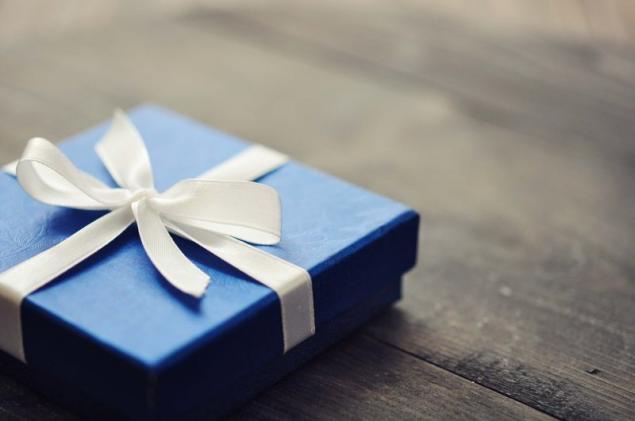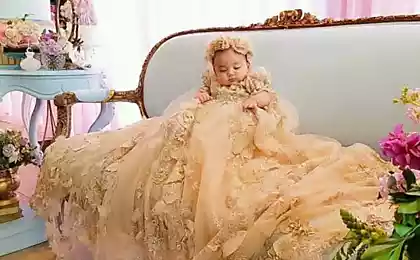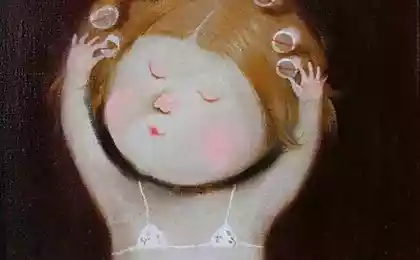605
Why are we choosing a gift, rarely "get" the desires of our loved ones
Decided to find out how adequately we come to the process of donation and whether it is possible to choose the perfect gift.
Read lifehack from The New York Times and a group of researchers found:
While we scoured online stores and halls, huge shopping centers, by engaging in this passionate and irritated the hunt for the perfect gift, researching and studying the mechanisms of giving and receiving, did for us a small opening. Their advice: pay attention to gift cards because the smaller the gift, the more he will be appreciated.
Not to say that these kinds of gifts many supporters, and you seem to shudder to think about it and recoil from it as from fire. But the sad truth is that, despite the General cold attitude to gift cards, according to the National retail Federation of the US, they were the most popular request since 2007 year. Roughly speaking, asked: "what would you like to get to the next holiday — perfume, jewelry or a book?". And the people answered: "Oh, no, better a gift card than all of these unexpected surprises."
But each of us believes that our "beneficiary" is better, isn't it?
Maybe so, but it requires another clause. In the report, which was presented last year at the conference of the American Society for personal and social psychology, researchers tried to analyze the emotional turmoil during the exchange of gifts, noting that the sincere intentions of the donor very often fail to reflect the true desires of the recipient.
When a Professor of marketing at the University of Cincinnati Maria Steffel and her colleagues asked the respondents to tell what gifts they prefer to give, scientists have a very specific and highly personalized answers. The donors, confined to the idea "I think it's something that he looked forward" immensely proud to spend a nightmarish amount of time and effort on finding or creating a gift that is waiting for the recipient. And the closer the relationship, the more donors tend to believe that they must make a choice of gift to yourself.
However, when these same people were asked what they would like to have, in the majority of cases respondents answered that they would prefer to receive a gift card for a certain amount of money that would give them the opportunity to choose exactly what they want.
"We came to the conclusion that when people think about gifts, they focus on the personality traits of the recipient — said Maria Steffel. But when the recipients appreciate the gifts, they think of their current needs, what they want and what they need. Thus, we encourage donors to focus on what people would like to have, not that it would fit".
As it is difficult to know what really a man wants (even if he has been quoted saying "I like it", does not mean that he would like to have), Dr. Steffen advises not to cheat themselves, and resort to a simple solution: "Ask!".

The funny thing is that the direction of research was largely inspired by his own experience Steffel, her suffering during the selection of the next gifts and constant setbacks in this field. For example, a pair of mittens for the oven with individual monograms, which she chose for her friends-the newlyweds ultimately never appeared in the kitchen of friends and were not used. Another case, which tells the doctor, was connected with the Christmas present uncle:
"We chose a lovely shirt," she recalls, " which was perfect uncle: pattern, color, size and style. So perfectly that when he opened this gift, he was in exactly the same shirt."
Ironically, other studies have shown that if recipients like their gift, they do not attach importance to how much effort the giver put into your gift. They just enjoy using the thing itself.
But (attention!) if suddenly to recipients not like the gift, they will think you put little effort in its preparation and is not thinking about the person you're giving it.
Thoughts and time are more concerned about donors because it makes them feel closer to the person whom they prepare a gift, says Nicholas Epley, Professor of behavioral psychology at the University of Chicago.
Additional studies show why gift cards can be the salvation in this endless drama with gifts. For example, the paper published a couple of years ago in the journal Behavioral Decision Making, described an interesting pattern. When people are on holiday cash instead of a gift (our famous envelopes), they subsequently prefer to use the money for a utilitarian purpose.But when people get something with a title like "gift card" that is tied to a credit card or a particular store,the recipient focus on the word "gift" that lets them unhappy and pragmatic resolution to treat yourself and use this map as your heart desires. In the end, instead of the usual food basket or kettle that has long been a need to change, people are buying perfume, expensive books or similar impermissible for the crisis time of the indiscretion.
According to scientists, map of us can help out in the situation with the search of gifts especially for picky people picky who we can never please with a gift, although I try.
Evan Polman, a psychologist and Professor of marketing at the University of Wisconsin-Madison, found that from 7466 buyers in the "black Friday" 2013-year, 39 percent confirmed that they were choosing gifts for people can be defined as "picky". He and his colleagues have been studying these types and eventually identified two types of "picky" people.
"Giving believe that receiving is snobby and arrogant attitude toward their gift, says Dr. Polman, and assume that their picky loved ones will return, re-gift or throw away a gift. Thus, they feel like a failure. As a result, they typically either spend less on a picky person or not give anything at all, or opt for a gift card".
So, if you want to save a lot of time and preserve emotional balance, you'd better ask such a picky person about his desires or allow it to choose independently. Studies show (e.g., the work of two scientists from Stanford and Harvard "Give them what they want: the benefits of certainty in the exchange of gifts") that such gifts the fussiest of eaters appreciate much more than your creative guesses. Therefore, granting such person the map, we at least will get rid of the feeling that gave something unnecessary and despicable. As they say, and the wolves are fed and the sheep intact.
However, many givers "don't like to resort to such measures", said Dr. Polman:
"We think that we are dismissive, if you ask about a gift from a loved one. It looks like a cold transaction in which no heat. The whole mystery of erased surprise for us in this context."
And it's hard not to agree with the doctor: children's memory of the miracle makes us in any festive day that someone is a miracle for us to do. Alas! And the memory slowly erased, and the concept of miracle changes with time, and we seem to be steadily moving away from childhood. It is not about what we, adults, dry, and insensitive — gift card instead of a surprise. The pros and cons of this approach have been described, but finally I would like to draw attention to something else.
It reminds me of something worn out, but nonetheless a good phrase: "You're either right or happy". Something I want to say about gifts: either you're ever dissatisfied legible, or all receiving with gratitude happy. Because in the end, it's all about our sense of self, and if we want to festive joy, the first and most important gift we have to make for yourself: allow yourself to enjoy the little things and attention.
Also interesting: beware of the gift! What not to give
What gifts to accept and which not
Well, if we decide to make any holiday torture for loved ones in the style of "prove you love me and you guess the greatest gift on earth," I'm afraid a gift card from a favorite emotionally exhausted, we can not avoid.
So science says the same thing. With party! published
Source: monocler.ru/uverenyi-chto-nashli-idealnyiy-podarok-podumayte-eshhyo-raz/
Read lifehack from The New York Times and a group of researchers found:
- why are we choosing a gift, rarely "get" the desires of our loved ones
- what are two types of "picky" recipients and what is their problem
- why gift cards are better than the much-loved in our country, the envelopes with money.
While we scoured online stores and halls, huge shopping centers, by engaging in this passionate and irritated the hunt for the perfect gift, researching and studying the mechanisms of giving and receiving, did for us a small opening. Their advice: pay attention to gift cards because the smaller the gift, the more he will be appreciated.
Not to say that these kinds of gifts many supporters, and you seem to shudder to think about it and recoil from it as from fire. But the sad truth is that, despite the General cold attitude to gift cards, according to the National retail Federation of the US, they were the most popular request since 2007 year. Roughly speaking, asked: "what would you like to get to the next holiday — perfume, jewelry or a book?". And the people answered: "Oh, no, better a gift card than all of these unexpected surprises."
But each of us believes that our "beneficiary" is better, isn't it?
Maybe so, but it requires another clause. In the report, which was presented last year at the conference of the American Society for personal and social psychology, researchers tried to analyze the emotional turmoil during the exchange of gifts, noting that the sincere intentions of the donor very often fail to reflect the true desires of the recipient.
When a Professor of marketing at the University of Cincinnati Maria Steffel and her colleagues asked the respondents to tell what gifts they prefer to give, scientists have a very specific and highly personalized answers. The donors, confined to the idea "I think it's something that he looked forward" immensely proud to spend a nightmarish amount of time and effort on finding or creating a gift that is waiting for the recipient. And the closer the relationship, the more donors tend to believe that they must make a choice of gift to yourself.
However, when these same people were asked what they would like to have, in the majority of cases respondents answered that they would prefer to receive a gift card for a certain amount of money that would give them the opportunity to choose exactly what they want.
"We came to the conclusion that when people think about gifts, they focus on the personality traits of the recipient — said Maria Steffel. But when the recipients appreciate the gifts, they think of their current needs, what they want and what they need. Thus, we encourage donors to focus on what people would like to have, not that it would fit".
As it is difficult to know what really a man wants (even if he has been quoted saying "I like it", does not mean that he would like to have), Dr. Steffen advises not to cheat themselves, and resort to a simple solution: "Ask!".

The funny thing is that the direction of research was largely inspired by his own experience Steffel, her suffering during the selection of the next gifts and constant setbacks in this field. For example, a pair of mittens for the oven with individual monograms, which she chose for her friends-the newlyweds ultimately never appeared in the kitchen of friends and were not used. Another case, which tells the doctor, was connected with the Christmas present uncle:
"We chose a lovely shirt," she recalls, " which was perfect uncle: pattern, color, size and style. So perfectly that when he opened this gift, he was in exactly the same shirt."
Ironically, other studies have shown that if recipients like their gift, they do not attach importance to how much effort the giver put into your gift. They just enjoy using the thing itself.
But (attention!) if suddenly to recipients not like the gift, they will think you put little effort in its preparation and is not thinking about the person you're giving it.
Thoughts and time are more concerned about donors because it makes them feel closer to the person whom they prepare a gift, says Nicholas Epley, Professor of behavioral psychology at the University of Chicago.
Additional studies show why gift cards can be the salvation in this endless drama with gifts. For example, the paper published a couple of years ago in the journal Behavioral Decision Making, described an interesting pattern. When people are on holiday cash instead of a gift (our famous envelopes), they subsequently prefer to use the money for a utilitarian purpose.But when people get something with a title like "gift card" that is tied to a credit card or a particular store,the recipient focus on the word "gift" that lets them unhappy and pragmatic resolution to treat yourself and use this map as your heart desires. In the end, instead of the usual food basket or kettle that has long been a need to change, people are buying perfume, expensive books or similar impermissible for the crisis time of the indiscretion.
According to scientists, map of us can help out in the situation with the search of gifts especially for picky people picky who we can never please with a gift, although I try.
Evan Polman, a psychologist and Professor of marketing at the University of Wisconsin-Madison, found that from 7466 buyers in the "black Friday" 2013-year, 39 percent confirmed that they were choosing gifts for people can be defined as "picky". He and his colleagues have been studying these types and eventually identified two types of "picky" people.
- Preferences the first type is relatively simple: they want the same as always.
- The more irritating type of "picky" is simply an opinion on the gifts and the givers always puzzled over that prefer these people.
"Giving believe that receiving is snobby and arrogant attitude toward their gift, says Dr. Polman, and assume that their picky loved ones will return, re-gift or throw away a gift. Thus, they feel like a failure. As a result, they typically either spend less on a picky person or not give anything at all, or opt for a gift card".
So, if you want to save a lot of time and preserve emotional balance, you'd better ask such a picky person about his desires or allow it to choose independently. Studies show (e.g., the work of two scientists from Stanford and Harvard "Give them what they want: the benefits of certainty in the exchange of gifts") that such gifts the fussiest of eaters appreciate much more than your creative guesses. Therefore, granting such person the map, we at least will get rid of the feeling that gave something unnecessary and despicable. As they say, and the wolves are fed and the sheep intact.
However, many givers "don't like to resort to such measures", said Dr. Polman:
"We think that we are dismissive, if you ask about a gift from a loved one. It looks like a cold transaction in which no heat. The whole mystery of erased surprise for us in this context."
And it's hard not to agree with the doctor: children's memory of the miracle makes us in any festive day that someone is a miracle for us to do. Alas! And the memory slowly erased, and the concept of miracle changes with time, and we seem to be steadily moving away from childhood. It is not about what we, adults, dry, and insensitive — gift card instead of a surprise. The pros and cons of this approach have been described, but finally I would like to draw attention to something else.
It reminds me of something worn out, but nonetheless a good phrase: "You're either right or happy". Something I want to say about gifts: either you're ever dissatisfied legible, or all receiving with gratitude happy. Because in the end, it's all about our sense of self, and if we want to festive joy, the first and most important gift we have to make for yourself: allow yourself to enjoy the little things and attention.
Also interesting: beware of the gift! What not to give
What gifts to accept and which not
Well, if we decide to make any holiday torture for loved ones in the style of "prove you love me and you guess the greatest gift on earth," I'm afraid a gift card from a favorite emotionally exhausted, we can not avoid.
So science says the same thing. With party! published
Source: monocler.ru/uverenyi-chto-nashli-idealnyiy-podarok-podumayte-eshhyo-raz/
Amazing morning amaranth porridge with dried apricots
During holidays, electricity in Germany was free























